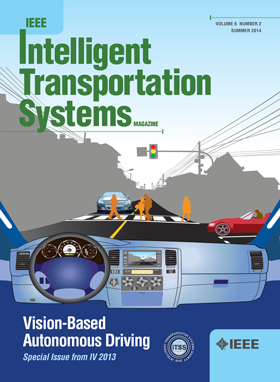Stochastic Behavior Modeling and Optimal Bidirectional Charging Station Deployment in EV Energy Network
IF 7.9
1区 工程技术
Q1 ENGINEERING, CIVIL
IEEE Transactions on Intelligent Transportation Systems
Pub Date : 2025-03-31
DOI:10.1109/TITS.2025.3553513
引用次数: 0
Abstract
Electric vehicle energy network (EVEN) enables the transmission of renewable energy from rural to urban area by the flexibility of EVs via energy exchange. In this paper, (dis)charging behavior modelling and bidirectional charging station (BCS) deployment optimization are addressed, since they are crucial in EVEN for EV accommodation, renewable energy utilization, drivers’ profitability estimation, operators’ cost assessment, and financial policy establishment. A novel stochastic Markov (dis)charging behavior model is proposed to calculate the spatiotemporal load pattern considering the realistic factors such as personal features, state of charge (SoC), electricity price, and BCS locations. Unlike most works ignoring energy trading, six scenarios are explored: (S1) no trade; (S2) trade in main battery. (S3) trade in extra battery. (S4) trade in extra ultracapacitor; (S5) trade in both main and extra battery; (S6) trade in both main battery and ultracapacitor. Also, a multi-objective BCS deployment strategy is newly designed, aiming at minimizing installation cost and driver’s electricity bill, while quality of service (QoS) and voltage stability are ensured. An improved hybrid algorithm is developed, which combines hill climbing for enhanced exploitation and particle swarm optimization for better evolvement based on genetic algorithm framework. The simulation validates the fitting ability of charging model, the effectiveness of parameter selection algorithm and the deployment approach. Comparing 6 scenarios, benefits of energy trading in EVEN is confirmed and the superiority of ultracapacitor for trading is demonstrated. The feasibility of financial policies is also studied, and certain guidance is provided for drivers to improve their cost.电动汽车能源网络随机行为建模与最优双向充电站部署
电动汽车能源网络(EVEN)利用电动汽车的灵活性,通过能源交换将可再生能源从农村地区传输到城市地区。本文研究了(非)充电行为建模和双向充电站(BCS)部署优化,因为它们对电动汽车的住宿、可再生能源利用、驾驶员盈利能力估计、运营商成本评估和财务政策制定至关重要。提出了一种考虑个人特征、荷电状态、电价和BCS位置等现实因素的随机马尔可夫(非)充电行为模型。与大多数忽略能源交易的作品不同,本文探讨了六种情况:(S1)没有交易;(S2)主蓄电池贸易。换掉多余的电池。(4)交易额外的超级电容;(五)买卖主蓄电池和备用蓄电池;主电池和超级电容器兼营。设计了一种多目标BCS部署策略,在保证服务质量(QoS)和电压稳定性的同时,最大限度地降低安装成本和驾驶员电费。提出了一种基于遗传算法框架的改进混合算法,该算法将爬坡优化与粒子群优化相结合,以增强开发能力。仿真验证了充电模型的拟合能力、参数选择算法和部署方法的有效性。通过对6种场景的比较,证实了EVEN中能源交易的好处,并论证了超级电容器用于交易的优越性。并对财政政策的可行性进行了研究,为司机提高成本提供了一定的指导。
本文章由计算机程序翻译,如有差异,请以英文原文为准。
求助全文
约1分钟内获得全文
求助全文
来源期刊

IEEE Transactions on Intelligent Transportation Systems
工程技术-工程:电子与电气
CiteScore
14.80
自引率
12.90%
发文量
1872
审稿时长
7.5 months
期刊介绍:
The theoretical, experimental and operational aspects of electrical and electronics engineering and information technologies as applied to Intelligent Transportation Systems (ITS). Intelligent Transportation Systems are defined as those systems utilizing synergistic technologies and systems engineering concepts to develop and improve transportation systems of all kinds. The scope of this interdisciplinary activity includes the promotion, consolidation and coordination of ITS technical activities among IEEE entities, and providing a focus for cooperative activities, both internally and externally.
 求助内容:
求助内容: 应助结果提醒方式:
应助结果提醒方式:


